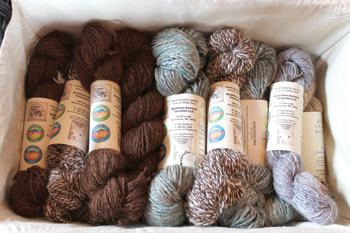A Warm, Fuzzy Business You Can Love: Bozeman Alpaca Traders
Saturday Mar. 31st, 2012
You’ve seen the ads on television. Fuzzy-headed Alpacas and happy people talking about how Alpacas changed their lives. You might have wondered what the fuss is about. Debbie Jesse can tell you. She and her husband Steve breed and sell Alpacas on their 20-acre ranch west of Four Corners, called Bozeman Alpaca Traders.
“The fiber is a luxury fiber, considered a notch better than cashmere,” she says. “Lighter, warmer, softer, stronger than sheep wool and hypo-allergenic.” Historically, Alpaca fiber was known as the “Fiber of Gods” and was highly prized. Today interest in the fiber, and the animals, is increasing since they were introduced to the United States nearly three decades ago.
There are two kinds of Alpacas: Huacaya and Suri. The Huacaya fiber is short, dense and woolly looking, and the Suri fiber is silky and has a high luster. The Suri is less common, and the specialty of Bozeman Alpaca Traders.
“We manage a herd of 35. Nineteen are ours and the rest are client animals who board with us,” Debbie says. They breed Suri alpacas for correct conformation, quality fleeces and gentle dispositions. While the Alpaca is a low-maintenance animal, there is still plenty to do on the ranch.
Steve Jesse, a retired medical doctor, has the medical, genetic and scientific knowledge to monitor the herd health with regular physical exams and physical maintenance. Debbie has a nursing, business and marketing background which is an asset for this vertically integrated home-based business.
Together they raise the Alpacas and hand-shear once a year.
“It takes the two of us about an hour to shear one adult,” Debora says, “and we do all 35 in about a week.”
Each animal yields 4.5 to 5 pounds of fiber, taken primarily from the blanket, which is the area from the shoulders to the hips, along each side. Once harvested, the fiber needs to be picked — cleaned of grass, hay, burrs, pine needles and the like. Then they wash and dry it. Carding is the traditional method of preparing fiber for spinning into yarn. The fiber is divided into batts, ready to spin. Debbie uses a spinning wheel to spin the Suri yarn, which they sell at Farmer’s Markets in Bozeman and Big Sky and online.
Bozeman Alpaca Traders is one of the founders of Yellowstone Alpaca Breeders Association, now an official affiliate of the national Alpaca Owners and Breeders Association. Their enthusiasm is contagious.
“We’ve helped six Alpaca businesses start in Montana,” Debbie says. For anyone considering the business, she advises doing lots of research. “Talk to breeders, go to shows and research online,” she says. “Look at the resources in the area of the state where you want to do business. Mt.gov has a nice primer to help businesses start in Montana.”
The Made in Montana program has been a benefit, too.
“People from out of state are very excited to find things made in Montana,” Debbie says. “Visitors like to get souvenirs.” The authenticity of Montana-made products make them popular items.
Like any successful business, Bozeman Alpaca Traders looks for ways to enhance and expand their product. Along those lines, they’re experimenting with blending colored silk with the Suri fiber.
“We launched it last year at the Farmer’s Market and it sold out right away,” Debbie says. So far they’ve developed Alpine Mist, Huckleberry Heather and Rocky Mountain Merlot.
Alpacas live to be 20-25 years old, and healthy animals can breed their entire life. The adaptable animals eat grass, chew cud and don’t need a great deal of space. They have soft, padded feet with two toes, are about three feet tall at the withers and weigh around 175 pounds.
They do spit, but only as a defense mechanism.
“Alpacas like people, but they can be a bit standoffish at first because they are a prey animal. They’re curious and very aware,” Debbie says. They’re social animals who hum to communicate and use non-verbal signals like neck posturing, ear and tail positioning and head tilt as well.
She discovered they’re pretty lovable, too.
“During the time you spend with them they really do become an extension of family. You don’t realize how hard it is to sell an animal — it’s almost like giving away a pet. They are intelligent and curious, with individual personalities. I was surprised to feel a bit of a loss when I sold one.
“I didn’t expect that. I looked at it as purely a business,” Debbie says. “I didn’t anticipate there would be an emotional attachment.”
Some people purchase Alpacas simply for pets, while others are seeking a rural, renewable business. In either case, the fuzzy-headed creatures not only produce the “Fiber of Gods” but give people an opportunity to be part of a sustainable Montana agricultural community.
Lynn Kinnaman is the owner of Works by Design, a website design company, and helps businesses and individuals communicate their message through writing, marketing and an effective online presence. She writes for various magazines and has just published the book Skinny Budget Marketing for small to mid-sized businesses. She can be contacted at Lynn@LynnKinnaman.com/
| Tweet |